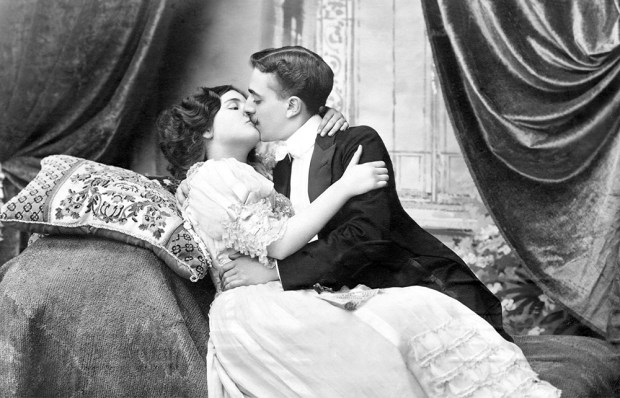As Sharon stooped to pour boiling water from the kettle into two mugs, I studied her back and wondered what, if anything, remained in me of the love I once had for her. Was there a residue somewhere? Or a stain? I pictured her back as it had been a dozen years earlier, tanned by the Sardinian sun and bisected by the thin turquoise strap of her bikini top.
My love for Sharon was more in the nature of a terrible mental illness than anything nourishing, and when it was at its height, we went away for a week to Santa Teresa Gallura, a quiet seaside town at the northern tip of the island. We stayed in a cool, family-run hotel with views from our window across the blue Strait of Bonifacio to the southern coast of Corsica, and looking the other way, down to the town beach. All week, Sharon wore a pair of bubble-gum pink flip-flops that came free with the latest issue of Cosmopolitan. She also had a new tattoo on that hard back, a blue ascending cherub, and she was obsessed about keeping it moistened with extra daubs of sun cream. On the plane out, I memorised two essential Italian phrases for going abroad with Sharon: lei è vegetarania — she is vegetarian, and puo tenere questi nella cassaforte? — can you keep these in the safe?
At that time Sharon was unhappy with her life and cried all the time. When we’d first met, she’d said to me, ‘All I want from you is a good time and an alarm clock.’ Now all she wanted from me was a listening ear while she listed and lamented the causes of her unhappiness, which were more recondite and various than the causes of the first world war.
The town beach was a small, blindingly white cove lapped by a pellucid sea and crowded with Italians. We trooped down there each day with rolled-up towels under our arms. I don’t know what sort of Italians they were, or to which Italian social class they belonged, but I felt or imagined we had found ourselves in a society that was both sophisticated and kind. After the first day we seemed to be an instantly recognisable, even popular couple, on that beach, in spite of, or perhaps because of, Sharon’s sour face and continual outbreaks of weeping. Nobody stared. But accidentally to catch someone’s eye would be instantly rewarded with a beautiful, warm smile, or a friendly ‘Ciao!’ or even a tanned arm raised in salute.
I remember glancing up for a moment during one of Sharon’s jeremiads at five women standing and chatting under a yellow and white striped beach umbrella. Chatting is perhaps too English a word to convey the proximity, the intimacy, the liveliness, the disorderliness, the conviviality, the laughter, the vivacity. Small children clung to some of the legs or played hide-and-seek among them. All the young mums wore surprising sunglasses and arresting swimsuits and were gorgeously tanned, but it was their unaffected delight in each other’s company, and in life itself, that stood out. And then I returned my attention reluctantly to this unhappy, tattooed, self-absorbed, orange-fingered, sexually incontinent, bottle-blonde English woman to whom I was horribly enslaved, and refocused my attention on her litany of criticism and complaint.
Why were her hands still trembling so badly when she’d only had two bottles of wine last night? Had I not noticed the sarcasm with which that breakfast waitress had said how nice it was to see her down at breakfast this morning? Why had I taken photographs of her that showed her stomach (like Olga Korbut’s in her prime) in such a bad light? What was she doing here anyway in this boring place and with someone as boring as me? Why couldn’t she find a proper man? Why were all of the men she knew so fundamentally stupid? If she rolled all her current boyfriends into one, they wouldn’t make one whole, good man. ‘But Sharon,’ I gently contended. ‘Aren’t you confusing intelligence with virtue?’
I remembered how she had snatched up her book — a history of Cosa Nostra — then burst angrily into tears again. I remembered too how, when I got back to England after our holiday, my own rotten infidelity to my girlfriend was discovered three seconds after I returned to her the novel I’d borrowed — with the orange boarding-card stub still in place as a bookmark.
I thought of all these things as I regarded Sharon’s back as she made the coffee. Apart from a stab of shame at my former abjectness, I might have been recalling a scene from a half-forgotten film or novel. But that back, though — it was so familiar to me at one time. I like a nice back.
Got something to add? Join the discussion and comment below.
Get 10 issues for just $10
Subscribe to The Spectator Australia today for the next 10 magazine issues, plus full online access, for just $10.
You might disagree with half of it, but you’ll enjoy reading all of it. Try your first month for free, then just $2 a week for the remainder of your first year.















Comments
Don't miss out
Join the conversation with other Spectator Australia readers. Subscribe to leave a comment.
SUBSCRIBEAlready a subscriber? Log in